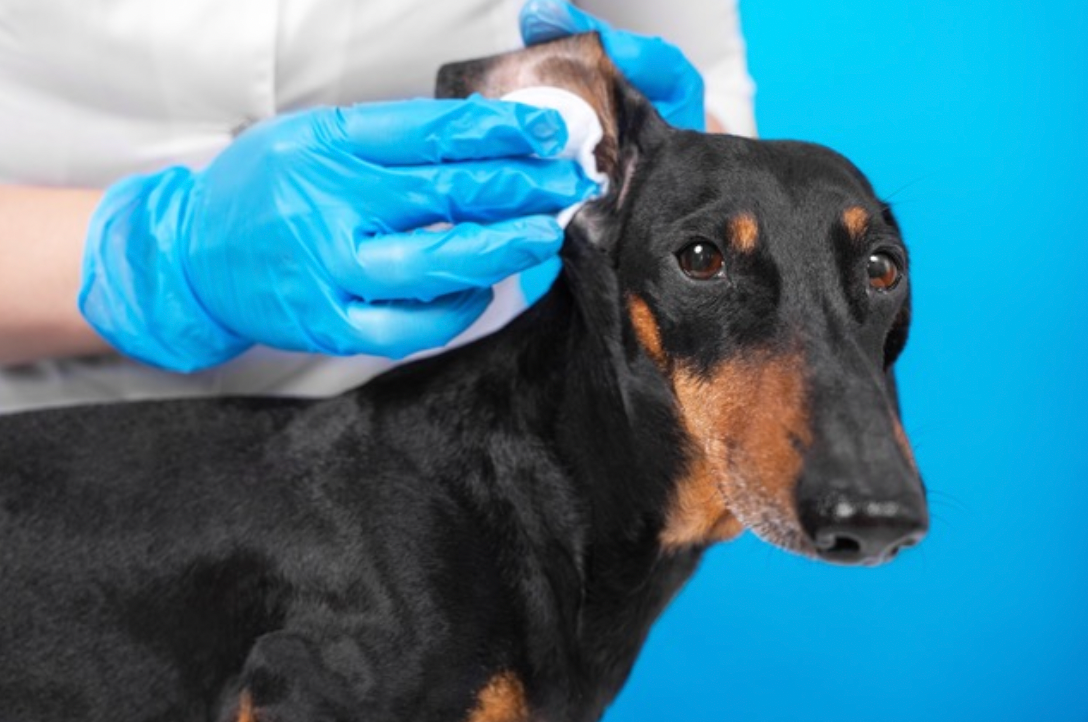Can Probiotics Help Dog Ear Infections?
August 1, 2022

Ear infections are among the most common conditions that dogs suffer from, but they can also be one of the most uncomfortable for your dog.
The ear is a delicate organ that helps to regulate balance and hearing. It's also where your dog's inner ear resides, which is responsible for processing sound and transmitting information to the brain about what's going on around them. When you take your dog for a walk, you can see the way their ears move back and forth as they listen intently to everything around them.
Once an infection sets in, however, it can cause severe pain for your pup, something no one wants. That's why it's important to understand how ear infections develop so you can make sure you're doing everything possible to prevent them from happening and treat them quickly if they do.
What Causes Ear Infections in Dogs?
The most common cause of ear infections in dogs is bacteria growing in their ears, which causes inflammation and swelling. This can be due to an external factor such as water getting into their ears after swimming, or it can be a result of a more internal issue like allergies or parasites. In some cases, there may not be an obvious cause for the infection at all.
How Do I Know if My Dog Has an Ear Infection?
If your dog has been acting strange lately, like shaking his head and scratching at his ears, it could be an indication that he's experiencing discomfort due to an ear infection.
You should also watch out for any discharge coming from their ears: yellowish or greenish fluid indicates a bacterial infection, while brownish or bloody fluid indicates a fungal infection (this type of discharge is more common in cats).
There are several symptoms that indicate a dog ear infection:
- Shaking or tilting their head frequently or scratching at his ears
- Your dog is holding his head tilted differently than normal
- Redness in the ears and/or around them
- Irritation or fatigue due to pain and itchiness in the ear
Types of Dog Ear Infections
There are several types of ear infections in dogs characterized by where the infection is located. Ear infection types include:
1) Otitis Externa
Otitis externa is an infection of the outer ear canal. It can be caused by bacteria, fungi or yeast and is characterized by inflammation and redness in the affected area.
Common symptoms include your dog constantly scratching their ears and shaking their head excessively, along with a foul odor coming from their ears.
The most common causes of this condition are swimming pools, allergies and ear mites, but it can also be caused by bacteria that spread to the outer ear canal as a result of trauma (such as getting hit by a car).
In rare cases where these conditions aren't present it could mean your dog has cancerous lesions on their skin; however this isn't common so it's best to see your veterinarian if you notice any unusual symptoms in order to rule out other possible problems before treating for otitis externa.
Traditional treatment for otitis externa involves antibiotics plus antifungal or antimicrobial drops applied directly into the affected area every day for about two weeks (or up until symptoms go away completely).
If left untreated it can lead to complications such as swelling around both sides of their face; however proper treatment should clear up any existing infections within just a few days so don't worry too much if something like this happens!
Just make sure they don't scratch at themselves while healing because this could lead back into an issue with bacterial overgrowth later on down the road.
2) Otitis Media
Otitis media is an inflammation of the middle ear, which is the air-filled space behind your dog's eardrum.
Symptoms include a dull and aching pain in your dog's ear, as well as a fever. Other signs might include discharge from the affected ear or a loss of balance.
The most common cause for otitis media is infection, but allergies or other conditions may also be to blame.
Treatment will depend on what caused it and how serious it is: antibiotics may be prescribed if there's bacterial involvement; pain relief medication if there's an underlying cause like trauma; warm compresses applied frequently throughout the day to help loosen up any hardened wax buildup in your pet's ears (this is especially true for those breeds with floppy ears that don't let much air get through).
3) Otitis Interna
Otitis interna is an inner ear infection in dogs. This is an uncommon type of inflammation, but it is usually seen in dogs with ear mites. Otitis interna can lead to deafness, balance problems, behavioral issues and even seizures if not treated properly.
The symptoms include nausea and vomiting as well as fever. If your dog has these symptoms and he does not seem to be responding to treatment for other types of ear infections, then you may want to consider an examination from a veterinarian so that they can make sure there aren’t any unseen complications from otitis interna or another issue causing this behavior change
Tips for Dog Ear Infection Treatment and Prevention
Here are some of our top tips for keeping your pup's ears healthy and happy:
1) Clean Your Dog’s Ears
Keep your dog's ears clean! You should check your dog's ears regularly for signs of infection or irritation. If you notice any redness or swelling, bring your dog to the vet right away.
To clean your dog's ears:
- Start by making sure your dog's ears are clean. If they aren't, you can use a damp cloth or cotton ball to wipe away any dirt or buildup inside them.
- Use an ear cleaner made specifically for dogs; this will be gentler on their skin than human-grade cleaning products, which may irritate the skin in their ear.
- When using an ear cleaner, apply it to a cotton ball or soft cloth and gently rub it into your dog's ear canal until you see that all of the dirt has been removed from inside their ear.
- Once you've cleaned out all of the dirt from inside your dog's ears, wipe away any excess moisture with a clean towel before letting them go back outside.
Pro Tip: Don’t Use Q-Tips
Don't use Q-tips to clean your dog's ears. It's tempting. They're so small and seem like the perfect tool for getting into those hard-to-reach places. But using a Q-tip to clean your dog's ears can actually cause permanent damage to their hearing.
The problem is that dogs' ears are very different from human ones, and using a cotton swab can push wax further into the ear canal, which can lead to infections or even hearing loss. Instead, try using a washcloth or gauze pad.

2) Feed a Healthy Diet
Feed your dog a balanced, healthy diet! Some studies have shown that diets high in omega-3 fatty acids like salmon and flaxseed oil may help prevent ear infections in dogs by reducing inflammation in sensitive areas like the middle ear area or eustachian tube (which connects the nose with middle ear).
So if you suspect that your dog has had repeated bouts of ear infections over time then consider switching their diet up by adding fresh, oily fish.
3) Try Probiotics For Dogs With Ear Infections
Probiotics are a type of beneficial bacteria that live in your dog's digestive tract. There are many different types of probiotics available today; you probably have some in your kitchen right now! They're often found in yogurt or other fermented foods like sauerkraut or kimchi.
Probiotics can help with digestion problems by encouraging the growth of good bacteria in your pet's body. They also help with immune system function and overall health by boosting the number of "good" bugs present in their bodies (and keeping them away from harmful ones). Probiotics are also helpful in preventing yeast growth in your dog's ears.
Offering your dog a daily probiotic, like Daily Dog, can significantly reduce their risk of ear infections and provide a balanced gut microbiome.
Keep Ear Infections at Bay
Ear infections are common in dogs. Many are caused by bacteria or yeast, and some can be treated with antibiotics. If your dog has an ear infection, you should see a vet as soon as possible. Your vet will likely recommend anti-inflammatory medications, antibiotics, or other treatments such as steroids or pain relievers depending on what type of ear infection your dog has.
Once the ear infection has cleared up, during antibiotic treatment, or even if your dog is currently healthy, try offering canine probiotics to keep any future problems at bay.
Read More:
Microbial community shifts between healthy and otitis affected dogs
Effective treatment of a dog using probiotic therapies
Probiotics for preventing acute middle ear infection
Probiotics for ear infections? How microbiota is linked to ear health
Recent Microbiome Insights in Otitis Media into Probiotic Strategies

